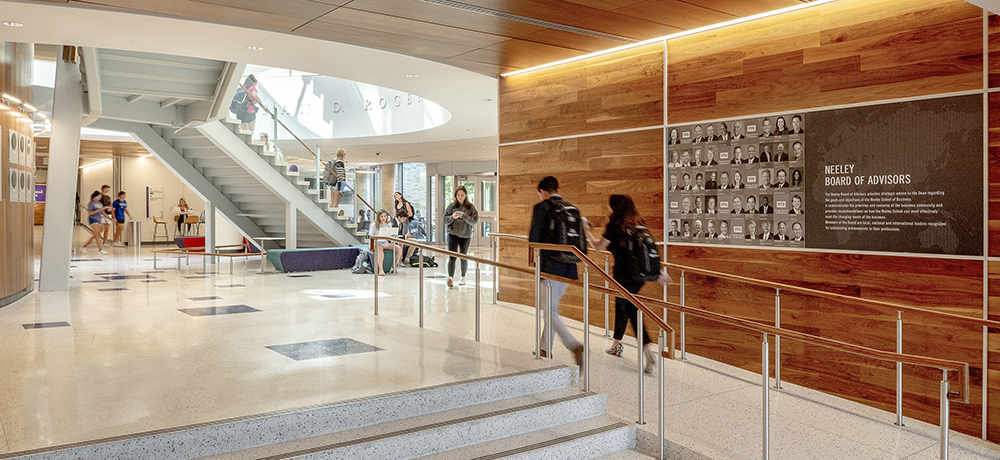Executive Education Insights: Eric Arseneau, faculty leader at TCU Neeley Executive Education, unpacks how generative AI is shifting from hype to real business impact—reshaping corporate strategy, innovation, and leadership.
May 01, 2025
By Eric Arseneau
Associate Professor of Professional Practice
Entrepreneurship and Innovation Department
Generative artificial intelligence (AI) has rapidly evolved from a corporate buzzword to a boardroom imperative. The technology is quickly ascending the "Slope of Enlightenment” in Gartner’s Hype Cycle, as organizations begin achieving tangible and repeatable benefits from its applications. As an entrepreneurship professor at TCU, I have observed generative AI adoption firsthand through interactions with my students and corporate leaders. I have also deeply integrated AI into my personal and professional life.
The applications of generative AI are transformative. But how did we arrive at this point, and where might we be headed next?

The Fast-Track Journey of Generative AI
While the concept of AI dates back to the earliest days of computing, the 2022 release of ChatGPT by OpenAI marked the introduction of AI to the mainstream consciousness. Initially launched as a conversational tool, ChatGPT’s features expanded quickly to become an all-purpose utility for data analysis, image generation, coding, and much more.
The acronym “GPT” stands for Generative Pre-Trained Transformer, but in practical terms, it can be best understood as a General Purpose Technology – deployed whenever and wherever intelligence is required. Very competitive alternatives to ChatGPT have since emerged, and the race has officially begun to create the most intelligent systems. Few innovations have made such a broad impact across so many areas of business at such remarkable speed.
Emerging Trends in Model Specialization
As the generative AI industry matures, a key development will be in the specialization of AI models. The model is the “brain” of any AI software. Models are now being optimized for specific tasks such as coding, data analysis, voice-to-voice conversation, or marketing content creation. This specialization of models may initially lead to counterintuitive user experiences. For starters, significant trial and error is required to determine which model is best suited for a specific task.
For example, “reasoning” models, designed for complex, multi-step problems, often respond more slowly than other models. This is intentional, as these models are structured to internally critique and refine their outputs before presenting them to the user. Yet, to a consumer accustomed to equating speed with quality, this design choice can feel off-putting. We expect the newer model car to be faster than the older model. In the case of AI models, however, faster is not always better.
It is also very tempting to ask an AI model that performs one task well to handle another seemingly simpler task just as well. But remember, until the user experience evolves to where the software automatically determines which model to use, it is up to the user to switch between the models to fit their specific needs.
With the specialization in model performance comes an exciting future in software development. The most promising discussion around generative AI centers on empowering everyone to build software through natural language. In this way, generative AI tools may be shifting the way software is created, deployed, and maintained. To stick with the previous car analogy, we may soon see the car mechanic model play out in software. Just as faulty cars are taken to the mechanic when they need service, so too will software (that was completely built by AI) be taken to development agencies for repair.
So, if the director of human resources is unhappy with the cost or limitations of the enterprise software the company is using, it might be time for that director to assemble a team to build a custom, in-house solution. I suspect many companies will develop an entrepreneurial (product management) role as the leader of such new initiatives. When the custom software breaks or needs maintenance, it will be taken to software mechanics (who also use AI).

Navigating Common Pitfalls
Despite its promise, AI adoption is not risk-free. Executives fear inadvertently exposing sensitive intellectual property, while employees worry about job displacement. Organizations can also become overdependent on AI outputs, making them susceptible to inaccuracies or model hallucinations.
Here are some simple, proactive strategies I recommend to executives: establish clear usage guidelines, robust governance, and open dialogue. Leaders must emphasize AI’s supportive, not substitutive, role in the organization. Rather than defensively addressing potential misuse, corporate leaders should reward experimentation and celebrate small wins. Shifting the focus from detection and fear to empowerment and innovation fosters a positive adoption environment. In education, when I see teachers focusing on catching students using AI tools, I fear we are missing the forest for the trees.
Continuous Learning is Mandatory
Another significant friction point in corporate AI adoption stems from inadequate communication by AI technology providers. These organizations, likely driven by intense competition, often deprioritize supportive documentation and tutorials. As a result, managers face uncertainty about model functionalities, limitations, and ideal use cases. Closing this gap requires internal expertise, strategic partnerships, and focused executive education to enable responsible deployment despite limited external transparency.
Navigating generative AI’s rapid evolution demands continuous learning. Leaders must develop the agility and practical insight necessary to harness these tools effectively. In this environment, staying informed isn’t optional – it’s imperative.


